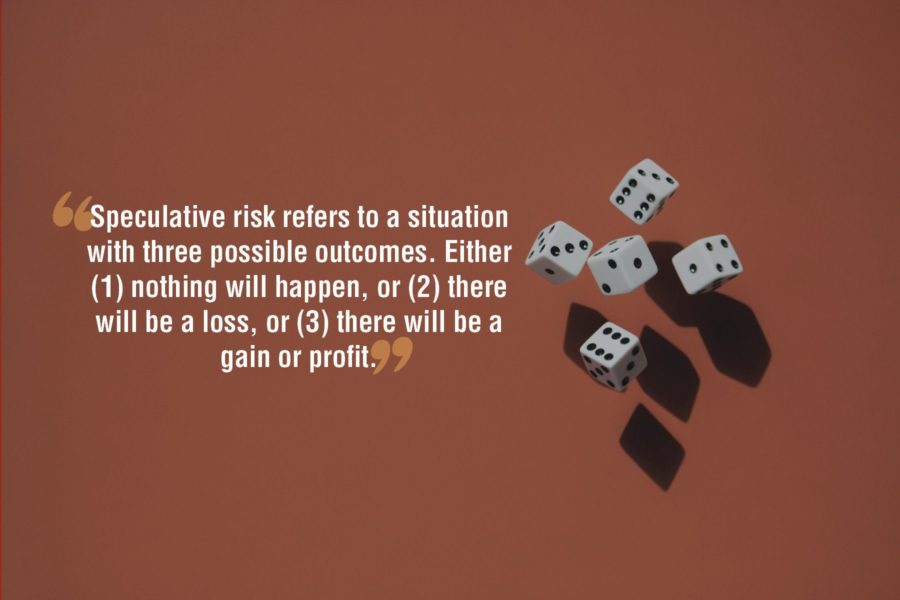Almost anything of value can be insured against the risk of loss. After starting its underwriting business with ocean voyages, Lloyds of London covered the first automobile, the first airplane and the first satellite. Lloyds wrote a policy on the “million-dollar legs” of actress Betty Grable, and in more recent times, it covered the even more valuable legs of soccer star David Beckham.
Are these examples of speculative risk? No. Although the first satellite had a very high risk of exploding on the launch pad (and Beckham ran a high risk of injury in every match), insurance coverage for these unusual clients was still based on sober actuarial calculations of the risk of loss, with a suitable price placed on the premium. In each case, the possibility of loss met the definition of an insurable risk.
Pure Risk Versus Speculative Risk
Pure risk refers to a situation that has only two possible outcomes. Either (1) nothing will happen, or (2) the value of the insured subject will be lost. Sometimes referred to as absolute risk, this type of risk is the basis of all insurance underwriting because it can be evaluated based on empirical data, along with a premium based on the value at risk.
Speculative risk refers to a situation with three possible outcomes. Either (1) nothing will happen, or (2) there will be a loss, or (3) there will be a gain or profit. The best example of speculative risk is gambling. When you enter a casino with $100, there are three possible outcomes with this type of risk. You will leave the casino with:
- $100 (Nothing happened. No change.)
- $1,000 (Something good happened. Value gained.)
- $0 (Something bad happened. Value lost.)
The Difference Between Investment and Gambling
Another common example of speculative risk is investing in the stock market. You can make money, lose money or even walk away. The main difference between investing and gambling is the financial objective of each business.
Investment houses are generally in business with the hope of enriching everyone involved. The stock issuer, underwriter, broker and investor will all profit from a win or suffer their losses together. In contrast, all games in the casino industry are designed to reliably enrich the house, with the casino and the gambler always on opposite sides of the win-or-lose outcome.
Exposure to Speculative Risk is by Choice
Along with the possibility of gain or profit, the other unique element of speculative risk is choice. For example, no sane person would choose to experience a house fire, a car accident or a serious illness (all of which are insurable risks) — but every person who invests in a company or places a bet on a sporting event has made a conscious choice to expose themselves to speculative risk.
Ironically, it is the possibility of winning at the casino (or financial gain in the stock market) that makes these activities unsuitable for insurance coverage. This is due to the aspect of human nature known as moral hazard. The definition of moral hazard is a lack of incentive to guard against risk when one is protected from its consequences.
Why Speculative Risk is Not Insurable
All speculative risks include moral hazard, while insurable business, property, health and life risks do not. The fact that you carry automobile insurance does not make you feel free to drive fast on wet pavement with no regard for the outcome.
The main idea of underwriting is to evaluate risk and the probability of loss. For example, when the insurance company takes on the uncertainty and potential losses of your auto coverage, it reviews your driving record and the statistical probability of accidents in your locale.
However, if you could be insured against losses on sports betting, you would have no incentive to bet moderately or to even try improving your odds by studying the team records and player strengths.
Likewise, if you could purchase insurance against the speculative risk of a bad investment, there would be no difference between blue chips and penny stocks, and no need to study the business or its public offerings. This is why insurance is not offered for investment or other speculative risk, at any price.
Key Takeaways
- A pure risk will produce only two possible outcomes: either (1) nothing or (2) a loss.
- A speculative risk has three possible outcomes: (1) nothing, (2) a loss or (3) a gain.
- Accident and illness are pure risks. Examples of speculative risks are gambling and investing.
- We are exposed to speculative risks by choice and to absolute risks by circumstance.
- The definition of moral hazard is lack of incentive to avoid risk when we feel protected from loss.
- Speculative risk is not insurable primarily due to the potential for moral hazard.
Questions about risk management?
As we’ve discussed, not all risks are created equal. While insurance can help mitigate the financial impact of pure risks, speculative risks like investments and gambling are not typically insurable. Understanding the distinction between these types of risks is crucial for both individual and business financial and insurance planning.
Ignoring the potential for loss won’t make it go away, but taking informed action can offer some peace of mind. Talk to a member of our team at Higginbotham today to begin building your personalized insurance and financial strategy.





